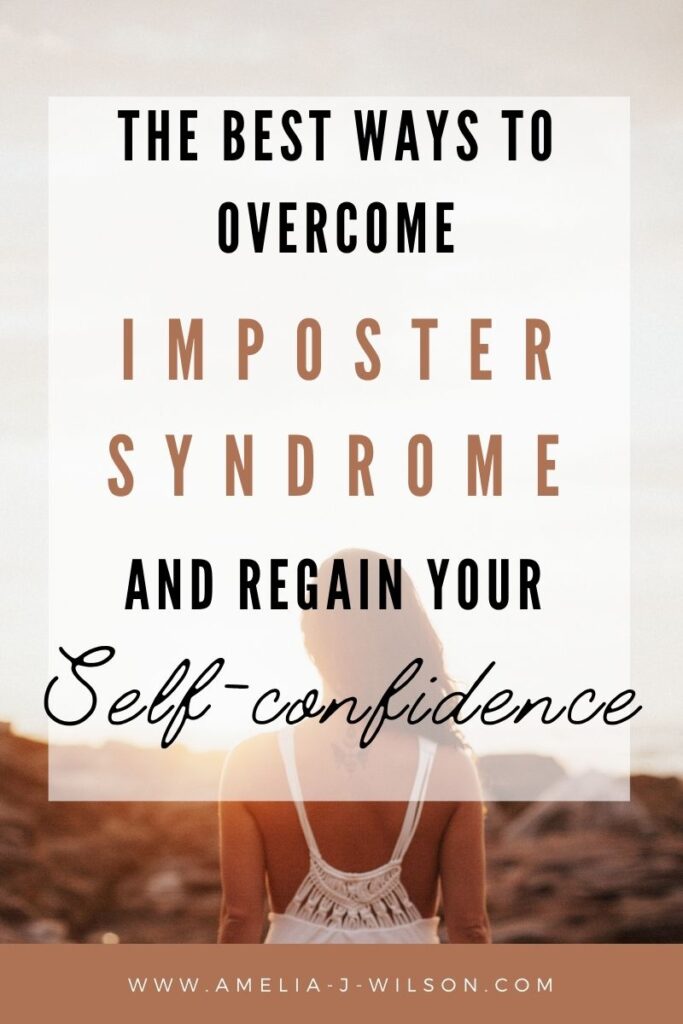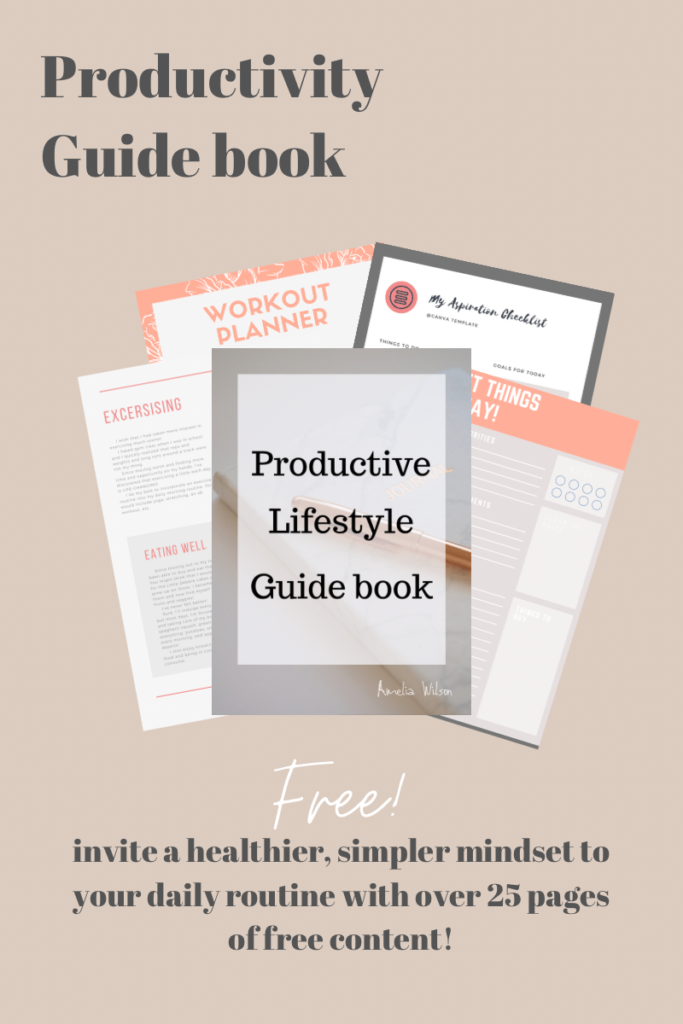Disclaimer: All of the views and opinions in this post are solely my own and are not sponsored. This post may include affiliate links, meaning I earn a commission through links at no cost to you.

If you haven’t read my first article on imposter syndrome, I highly recommend checking that out before moving here!
If you’re struggling with imposter syndrome and want to find relief, I’ve gathered a few steps to follow to beat this mentality. Notice I didn’t say “for good.” I can’t promise that you will never face imposter syndrome again. It’s an innate part of being human to compare yourself and your journey and to find minuscule and even nonexistent flaws in your work.
While these steps can’t cure you for good, rest assured they will always be here when you need them again.
Furthermore, I’d like to point out that each type of imposter syndrome may require a unique take to address it adequately. You can find out more about imposter syndrome and the types in my previous article or in this book, The Secret Thoughts of Successful Women by Dr. Valerie Young.
Also, if your mentality worsens or you struggle to get a grasp on your imposter syndrome, I always encourage that you speak to a therapist who may be able to provide more concrete answers than I can here.
1 Acknowledge your imposter syndrome
The first step to combating imposter syndrome is to acknowledge it. Recognize that you feel unworthy, incapable, and disappointed because you are experiencing imposter syndrome.
2 Face your emotions
Once you’ve acknowledged your imposter syndrome, it’s time to face your emotions. Really think about what you’re feeling and why you’re feeling it.
I’ve found that journaling can be a wonderful way to lay everything out. I recommend you sit down and take a twenty-minute, uninterrupted break to write down your thoughts. Let it be messy and all over the place if need be. Nobody but you has to read it.
If you need help getting started, ask yourself these questions:
- What am I feeling?
- Why do I feel this way?
- Do I feel like a fraud or a failure? Why might this be?
- Why am I unworthy?
This exercise can be painful. It can be hard to face your emotions head-on. If your sadness worsens, it’s okay to step away. Call up a friend or sit quietly with a family member if your feelings become overwhelming. I have also found that playing some happy music can help steer your mind away from your pain.
But you will have to come back to it at some point.
Facing your emotions and laying out your heart on the page is a great way to break that barrier between self and feeling. It’s also a great way to let it all out, everything you’ve been feeling, and come back to it with a fresh start and clear eyes. Again, take your time, and don’t be afraid to reach out if need be.
3 Separate fact from feeling
Once you’ve finished your twenty-minute journaling session, take a pause. Breathe and then go back and reflect. You can read what you’ve written if you’d like, or you can simply think about what you said on the page.
Now, I want you to imagine the page is a bottle of all of your emotions. They are no longer inside of you. Instead, they are in front of you. Give them a name or some sort of identifier. When you think about yourself, use the third person if it helps. I’ll give you an example of some things I might say if I were doing this exercise right now.
“I am Amelia, and you are my emotions. I’ll call you Jerry or Jerrys.”
“Amelia feels sad and unworthy because she judges herself on how easily concepts come to her.”
“This particular concept has been challenging, and now she’s overwhelmed and afraid of failing.”
“You are my feelings of fear and disappointment. But you are not me. You’re just something I feel. And that’s okay.”
I do want to point out how I transitioned between third-person and first-person. It will be up to preference, but third-person often helps us separate our being from our thoughts. I picked up this truck in Emotional Agility by Dr. Susan David. I highly recommend you give the book a read if you are struggling to separate your feelings from yourself.
Once you’ve acknowledged that your feelings are not you, you need to view your situation as if you were someone else watching it all go down. Imagine you’re a book character, and the reader hears your story.
If you want to write this down, it might look like this:
“Amelia sat at her desk, biting her nails. She knew it was a bad habit, but who could blame her? She had recently agreed to a challenging assignment by a big name company. Unfortunately, the article called for a ton of research, and Amelia became frustrated. She’d been sitting for hours and had made little progress. Why couldn’t she get it? She wanted the task to come easily to her. While she recognized that growth meant going beyond what you’re comfortable with, she hated the feeling of being an idiot. She wasn’t an idiot. But she sure felt pretty dumb at this moment.”
Again, it’s sort of a silly concept but notice how I wrote in the third person and laid out the thoughts and feelings? As a reader, you know that she feels like a failure but shouldn’t. We even acknowledged that growth is often challenging.
Sometimes it helps to take this outside perspective. While I know I am no idiot, it can often be nice to be reminded of my intelligence when I am questioning it at the moment.

4 Gain an outside perspective
If the above exercise isn’t working for you, don’t worry! You can always talk it out with your family, friends, or therapist! Typically, they will come with a clear heart and mind on the subject. Your friends often view you as worthy and important. They’ll hear what you have to say and will offer solid advice that encourages you that your feelings may be a bit different from reality. Not to say that they aren’t valid, but maybe your perspective is a bit off.
5 Make a plan
Once you’ve separated yourself from your emotions, you can begin to make a plan to tackle your imposter syndrome. Depending on what type of imposter syndrome you have and your current situation, your plan can look very different from another’s.
I will try to give generalized plans for each type, but you might have to make some modifications based on your situation.
The Perfectionist:
Acknowledge that perfection is impossible to achieve and life is messy. Reward yourself when you do well and try to push past things that don’t work out “perfectly.”
The Expert:
Acknowledge that it’s okay not to know everything and that nobody is really an “expert.” Find the value in continuing to learn and grow. It’s okay not to know it all now. That’s the joy of being human—to maintain curiosity and keep pursuing knowledge.
The Soloist:
Know that it’s okay to ask for help and find value in community. Humans have survived for so long because of their ability to help one another. You can’t do it all alone, and that’s okay.
The Superhuman:
Just as the soloist must ask for help, so should you. Recognize that it’s okay to delegate tasks to others if need be. Also, find value in breaks and relaxation.
The Natural Genius:
Acknowledge that you can’t understand everything the first go around. Some things will come easy to you, and others won’t. To grow is to challenge yourself. Don’t be discouraged by the things that urge you to grow.
6 Use affirmations
Affirmations are a great way to combat your imposter syndrome. Repeat them to yourself in the mirror each morning or evening, and eventually, you may believe them. After all, repetition is key, and the things we repeat to ourselves daily define who we are and what we think.
Here are some affirmations to try:
- I am worthy.
- I am enough.
- I am not an expert, and that is okay.
- I am very talented in my field, and I can offer what wisdom I have to others.
- It’s okay not to be perfect. Perfectionism is not the goal.
- It’s okay to ask for help.
- I am capable.
- I believe in myself.
- I enjoy working with others to achieve a common goal.
- I’m not afraid to ask for help.
- I’m not afraid to say “no” if I am overwhelmed.
7 Celebrate your wins
Defeating your imposter syndrome will take time. How long is dependent upon you and your situation. Once you begin your affirmations, try to take notice of your wins. Each time you succeed on something, congratulate yourself. Give yourself a treat and showcase some self-love through your love language.
Ask yourself the following questions and answer them in your journal to help you maintain a healthy relationship with winning:
- Why is this win so great?
- How did I get here? What did I do to earn this win?
- Why does this win make me happy?
- How can I repeat my steps going forward?
8 Face your losses
Similarly, you’ll have to face your losses as well. It’s inevitable that you will experience loss and failure going forward. That’s a part of growth and learning. Do your best to face these emotions and repeat steps 1-4 above if you find it hard to separate feeling from fact.
Once you’ve experienced a setback or failure, write about it. Answer these prompts below to help you maintain a healthy relationship with loss:
- Why is this loss so painful?
- How did I get here? What happened that prompted this loss?
- How does this loss make me feel?
- How can I redirect my energy moving forward, so this doesn’t happen again?
9 Take every opportunity as a chance to learn
As I mentioned above, failures and disappointment are often great opportunities for growth. It’s okay to mess up sometimes, and it’s okay not to have everything figured out. Try to mark each experience as a life lesson or as a chance to learn and better yourself.
Be gentle and try to love yourself, warts and all, no matter how muddy the water or how difficult the challenge.

If you like this post, check out some similar posts of mine below!
Feel free to leave a comment below and let me know your thoughts!
You can also email me with questions or concerns you may have at info.amelia.wilson@gmail.com
My new book, Witch in the Water, is available on Amazon!
Also, check out my poetry book, The Lights are on but Nobody’s Home, available now on amazon for $6.99 in paperback form!
Disclaimer: All of the views and opinions in this post are solely my own and are not sponsored. This post includes affiliate links, meaning I earn a commission through links at no cost to you.
Thanks again


2 responses to “Ways to beat imposter syndrome and regain your self-confidence”
Greetings! This is my first visit to your blog!
We are a team of volunteers and starting a new project in a community in the
same niche. Your blog provided us valuable information to work on. You have done a wonderful job!
I’m not that much of a internet reader to be honest
but your blogs really nice, keep it up! I’ll go ahead and bookmark your website to come back later on. Many thanks